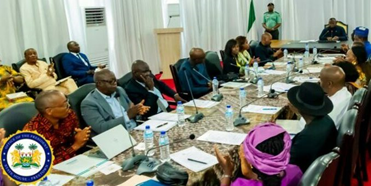President Bio Launches Presidential Council on Feed Salone
On Monday 10th October, President Julius Maada Bio officially launched the government’s Presidential Council for delivering the “Feed Salone Initiative”, and used the occasion to challenge the newly formed governing body to revolutionize agriculture for all Sierra Leoneans.
According to State House report, the formation of the council is in accordance with President Bio’s declaration that agriculture and food security are his second term’s foremost priorities.
“The Feed Salone initiative is the flagship program designed to deliver on the President’s vision to transform the agriculture sector and ensure food sovereignty, create jobs, reduce hunger, and boost economic growth in Sierra Leone,” says the report.
President Julius Maada Bio told council members that they are the experts and their role is to ensure food security is achieved.
“We have had a lot of failed attempts to feed this country, and it takes another generation to say they are going to make it work. That is the challenge we have, all of us present here.
“This is a working group, and as we move along, we can bring in representatives and other experts. But what I want to make clear here is the fact that we cannot fail. We must succeed because food is existential and we cannot be feeding on what other people are growing elsewhere, yet we suffer under the weight of the food crisis.
“We should be sure of where our next food will be coming from, but unfortunately for us, we have all the land available with enough rain even in October; we really don’t have to blame God. We have to blame ourselves for being lazy,” he said.
The President also said that the overall objective of the council is to feed Sierra Leone, stressing that despite the fact that the Ministry of Agriculture and Food Security is there, the governing body, in conjunction with the Presidential Initiative headed by Dr Kandeh Kolleh Yumkela, will involve researchers, bankers, farmers, nutritionists, civil society, the private sector, politicians.
He added that they will be there to do everything possible to achieve the initiative, because “feeding Salone is about all of us”.
“With you all in the council, we can lead a revolution that will speak for itself, and the activities involved here are so many, with a wide range of ministries, groups, and experts in the council. All the experts are here to make sure we identify what we need and do it best, even if it means we have to reside on the farm. Let’s stay there until we get it working.
“No country in the world has industrialised without an agricultural revolution. So, when we talk about industrialization, the basic has to be there, which is agriculture. This is not just about food security; it borders on economic growth.
“I am very confident and believe that I cannot start Feed Salone without the formation and launch of the Presidential Council. I am asking you to do a lot, including lead and stimulate growth across the country to achieve the Feed Salone Initiative.
“We are going to be scientific about this through the use of technology and those activities that have made others succeed and discourage our farmers from using traditional means. We can’t afford to embark on traditional ways of doing agriculture. So, I am calling on this group to do anything that can make this work because Feed Salone is not about President Bio; it is about and for us as a nation,” the President told council members.
Vice President Dr Mohamed Juldeh Jalloh, Chairman of the Presidential Initiative on Agriculture and Climate Change, the Minister of Agriculture, Dr Alfred G.O. Dixon, Dr Roland Suluku, the private sector, and government officials, also spoke at the meeting.
Minister of Agriculture and Food Security, Dr Henry Musa Kpaka, said the Presidential Council for Delivery of Feed Salone, which is chaired by President Bio, will provide a forum for elevating cross-cutting issues that affected the delivery of Feed Salone and the high-level political leadership for driving transformation.
He noted that while his ministry has the mandate for technical leadership and implementation in the field, the Council will play a facilitating role in supporting his ministry in solving cross-cutting issues, coordinating investment, ensuring policy consistency, monitoring, supervising implementation, and providing advocacy support for the Feed Salone Initiative.
What is not clear, however, is the cost of this initiative, which estimates suggest will cost hundreds of millions of dollars. And currently, the government does not have the cash to make such investment, and will have to look to the private sector and international investors.




